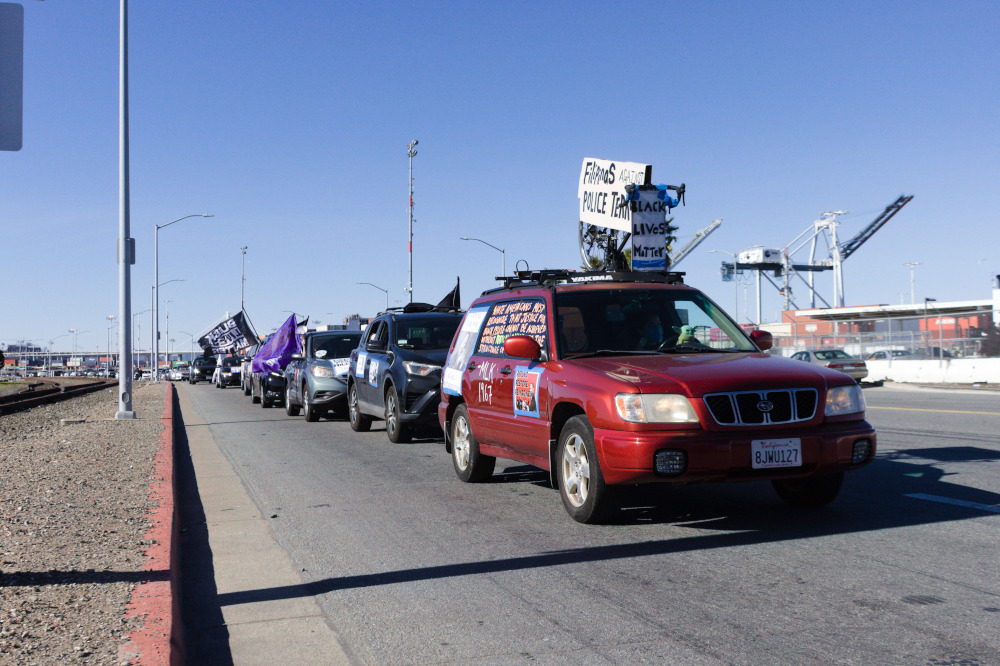A Martin Luther King Day caravan led by anti-police violence groups in the East Bay was cut short when demonstrators encountered a man holding a rifle – and organizers credit a community-based volunteer security group for de-escalating the situation without anyone getting hurt.
In fact, leaders of the Anti-Police Terror Coalition say the incident shows that armed police response is not always the best solution to potential violence.

“We talked him away. It was a mixture of the right body language, the right positioning, and communication, said Tur-ha Ak, founder of the Community Ready Corps and co-founder of the APTP. “That means that we don’t get escalated, we don’t scream and yell, we stay calm and talk through it.”
The caravan’s organizers said that the peaceful resolution of the threat by CRC proved the efficacy of alternatives to police in keeping communities safe. APTP Co-founder Cat Brooks said believes that this success in the community’s trust of CRC’s volunteers and their trust in the APTP when they were told to disperse.
“We’ve been pushing this line around community response for community crisis for six years, and what people always say ‘what do you do if somebody has a gun?’, that’s like one or two percent of the time,” said Brooks. “The response to Monday started years ago, CRC and APTP has been developing trust with the community for years now, for people to actually listen and leave and area calmly is because of the relationships that we have. And nobody got hurt.”
The caravan had started at the Port of Oakland and headed to the Alameda home of Oakland District Attorney Nancy O’Malley, who said in a report filed on January 7 that she would not indict the second police officer involved with the 2009 death of Oscar Grant with murder.
Demonstrators demanded that the Oakland police department budget allocations from Oakland’s general fund be cut by 50 percent, with those funds invested in mental health services, youth programs, and affordable housing as a part of a non-violent solution to crime prevention and public safety.
George Galviz, Executive Director of Communities United for Restorative Youth Justice, an Oakland non-profit that provides services to currently and formerly incarcerated youth, said that incarceration is not effective at maintaining public safety, particularly in poorer areas during the pandemic, as many crimes being committed arise of out necessity for bare essentials as unemployment remains high nationwide.
“Many of the crimes being committed are survival crimes being committed by the most economically desperate during the pandemic,” said Galviz. “The best way for us to achieve public safety is by providing basic needs of food, clothing, and shelter, services for those struggling from mental health crises, workforce development.”
The caravan itself has been happening during the weekend of Martin Luther King Jr. day since 2014, but this year’s caravan has had a markedly different tone according to Brooks, due to the nationwide movements to defund local police departments which has galvanized the country following the death of George Floyd in May.
“What’s shifted in the tone and tenor of this particular march is that the people were a bit more celebratory because we’ve seen the work move inside of city hall, people are seeing alternative models like MH First for responding to mental health crises instead of 911 being involved…We have a task force whose job it is to figure out where to direct OPD dollars towards things that actually keep us safe…people are seeing actual solutions about this,” said Brooks, referring to the 19 person Reimagining Public Safety Task Force, which is co-chaired by councilmembers Loren Taylor and Nikki Fortunato Bas.
According to Taylor, recommendations created by three advisory boards which report to the task force include 1) creating a civilian-led and operated community ambassador program to address non-violent, non-mental health incidents, 2) soliciting requests to reduce OPD roving patrols in some areas alongside requests for increasing patrols in others, and a 3) homeless alternative response team made up of social workers, substance abuse counselors, and “violence interrupters” who can take the lead in providing services in non-violent cases, and responding in partnership with police while deescalating violent cases, among several other recommendations.
“We are on a very aggressive bold journey to transform public safety, and it is complex with a lot of divergent views, but we are committed bringing that change as needed while improving and enhancing safety,” said Taylor.
Ak said that the key to the success of alternative public-safety models that do not rely on police does not involve police abolition, but rather diverting a significant of funding allocated for police departments to institutions that will help people get on their feet and never have to resort to crime in the first place, such as schools and resources to prevent recidivism.
“What we are advocating for effective investment and preventative conditions…it’s less about a utopian world view of no police, no jails, we have an immense about of investment in overtime and policing and our communities are still not safe, what we have to begin with is…investing in schools, after-school programs, re-entry committees…Yes what happened yesterday proved that alternatives can work, but we have to invest in them.”
At a press conference Thursday, organizers asked that the gunman be held accountable.
“In our political system, I’m not sure what the answer is, how much of a danger he is. Is he going to shoot another community up? But there have to be consequences,” Brooks said. “He broke all kinds of gun laws, and he’s a white man threatening Black and Brown bodies. People could have died.”






